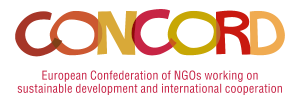The Multi-Annual Financial Framework (MFF) determines the budget spending of the EU for a period of at least five years. The current MFF which ran from 2014 to 2020, is coming to an end. The EU institutions and Member States are elaborating the new MFF for the period of seven years, from 2021 to 2027.
The procedure of establishing the MFF starts with:
1. A proposal by the European Commission is put on the table, that sets out the regulation laying down the MFF (the headings, instruments, structure, legal basis)
2. This proposal must be adopted by the Council of Ministers by unanimity, after obtaining the consent of the European Parliament.
Our confederation focuses on the External Instruments as these are the instruments which fund development cooperation. They currently represent about 6 % of the total EU budget under the umbrella “Global Europe” and will go until 10 % in the next budget.

MFF approved
Formally, the MFF is approved by a unanimous decision of the Council of Ministers with the Parliament having to also give consent.
The new budget entered into force in January 2021 for a period of 7 years, until 2027.
June 2021
NDICI – Global Europe approved by the European Parliament and the Council of the European Union
- On 9 June 2021, the European Parliament and the Council of the European Union gave green light to the NDICI-Global Europe regulation which entered into force on 14 June 2021. This was the last step of the adoption process and will allow the EU to allocate €79.5 billion for its external action over the next seven years.
More Information

December 2020
EU seven year development aid instrument finally agreed – but tarnished by EU migration politics
- On 18 December 2020 Member States endorsed the political agreement reached with the European Parliament on the Neighbourhood, Development and International Cooperation Instrument (NDICI). We welcome in particular the inclusion of a strong and legally binding Official Development Assistance (ODA) target of 93%. However, Member States agreed on deep cuts to the budgetary envelope in July. Further, the EU Member States’ demand that partner countries’ cooperation with EU migration politics be a condition for funding has been partially accepted.
Our reaction
October 2020
Joint statement on NDICI and humanitarian aid in the next Multiannual Financial Framework 2021-2027
- Ahead of the next round of negotiations between the institutions on the 2021-2027 Multi-annual Financial Framework (MFF) civil society organisations and NGOs called on decision-makers to reverse the deep cuts agreed to in the EU’s external action instruments by EU Heads of State/Government in July 2020. These cuts sent an alarming signal about European solidarity with the rest of the world. They hamper the EU’s ability to tackle the global crises that hit developing countries the hardest.
Our joint statement

SEPTEMBER 2020
Statement for MEPs on the final Multiannual Financial Framework 2021-2027
- In July 2020, the European Council proposed a reduction to Heading VI and to the Neighbourhood, Development and International Cooperation Instrument (NDICI) by 10%, and a further decrease to the already stretched thematic pillar. With only 10 years left to achieve the Sustainable Development Goals, our statement called on the European Parliament to reverse cuts to Heading VI and the NDICI as well as to set the thematic programme of the NDICI at 11,49%.
Our statement
AUGUST 2020
Statement of the final MFF negotiations outcome
- After two years of extensive negotiations on the Multi-annual Financial Framework 2021-2027, the European Council reached an agreement. In certain aspects, it could be considered an ambitious recovery plan for the European Union. However, major cuts were made to Heading VI: Neighbourhood and the World.
Our reaction
Green Deal, Human Development and NDICI programming
- In late August 2020, CONCORD issued a policy brief that continues to advocate for a 50% climate target to be included in the Neighbourhood, Development and International Cooperation (NDICI) programming. Moreover, the brief includes recommendations to compliment the operationalisation of this target.
Our policy brief
Digitalisation and NDICI programming
- This guidance note aims to provide practical guidance to civil society organisations participating in the consultation process of NDICI programming.
Our guidance note

JUNE 2020
Joint letter from NGO networks to European Council on Heading VI in the next MFF and Recovery Fund
- On 8 June 2020, a joint letter co-signed by CONCORD, VOICE, CAN Europe, Cooperatives Europe, Eastern Partnership Civil Society Forum, Eurodad, ENoP, EPLO and HRDN was sent to EU Head of States ahead of the European Council on 19 June 2020. The letter presents recommendations on Headving VI of the next Multi-annual Financial Framework (MFF) 2021-2027 and the Recovery Fund, “Next Generation EU”.
Joint letter
FEBRUARY 2020
Recommendations on the EU Programming process for external instrument
- CONCORD proposes its recommendations to inform the programming process for the 2021-2027 period – building on civil society lessons learned and experiences of the preceding programming process – and in particular, the programming guidelines and consultations at country level.
Our recomendations

DECEMBER 2019
Letter to Heads of States & Governments + Podcast
- Ahead of the EU council of 12th and 13th December, CONCORD together with Eurodad, CAN, VOICE, EPLO, HRDN and ENoP sent a letter to EU Heads of States and Governments to safeguard 10% of the future EU budget for external actions.
Our letter - This “Talking Development Podcast” podcast reveals the important elements that should be put into consideration for the new MFF. Stay tuned as our five experts explain why you should care about the new EU budget and what is at stake for European NGOs.
Our podcast (audio)
NOVEMBER 2019
Recommendations for the NDICI Trilogue
- The negotiations on the Neighborhood, Development and International Cooperation Instrument (NDICI) between Commission, Council and Parliament (so called trilogue) have started and this document presents CONCORD’s views and recommendations for the trilogue negotiations.
The recommendations
SEPTEMBER 2019
Recommendations on migration spendings
- CONCORD reacts to the current proposal of a 10% spending target of the external actions budget to migration and comes with some recommendations for improvement.
The recommendations
The Road to Budget4Solidarity : Half-Way there
- In this article, we recap the progress achieved within the European Parliament in regards to the MFF/NDICI negotiations. Head inside and hit the road!
The article

MARCH 2019
A direction to follow
- On March 27, following months of negotiations, the European Parliament finally confirmed its stand on the external instrument of the upcoming long-term EU budget 2021-2027. It is a commitment to the 2030 Agenda for Sustainable Development, human rights and gender equality.
CONCORD’s press release
A crucial step forward
- On 4 March 2019, the Foreign Affairs and Development Committees gathered to agree on their joint position on establishing the NDICI, the new single instrument for external actions under the next MFF. The vote’s outcome proves the committees are doing their part in creating a true budget for solidarity!
Our reaction

DECEMBER 2018
European Council
- On 13 & 14 December 2018, the European Council discussed the future EU budget. Ahead of that discussion, CONCORD and other umbrella organisations sent a letter to Heads of State and Government raising concerns on the amount dedicated to development aid.
The letter
NOVEMBER 2018
Foreign Affairs Council
- On 26 November 2018, the Foreign Affairs Council discussed the external instruments of the future EU budget. Ahead of that discussion, CONCORD and Eurodad sent a letter to the VP Federica Mogherini in which they raised concerns about the private sector instruments, namely the EFSD+ and the External Action Guarantee.
The letter
Analysis of the thematic programmes
- Through this document, CONCORD wants to explain in details why the current proposed amount of 7 billion EUR for thematic lines under the Neighbourhood, Development and International Cooperation Instrument (NDICI) is insufficient and will not allow the EU to deliver for its commitments. In parallel, the document develops an alternative proposition and concrete recommendations.
CONCORD’s analysis

OCTOBER 2018
MFF Conference
- On 12 October 2018, an important conference titled “EU Budget for the Future – the road ahead” gathered members from the EU institutions, policy makers and the media to discuss the future of the EU budget. Helle Thorning, CEO of Save the Children International, represented the voice of civil society in the panel.CONCORD used this key moment to raise awareness on its position and keep advocating for a #Budget4Solidarity
The web streaming
SEPTEMBER 2018
Analysis of the external programme regulation
- CONCORD went through the draft regulation of the NDICI, i.e. the programme for Development Cooperation (NDICI = Neighbourhood, Development and International Instrument). Find below the proposed amendments of the recitals and the annexes.
CONCORD’s proposal – recitals
CONCORD’s proposal – annexes - Also, CONCORD and Eurodad co-wrote 10 key concerns with the European Fund for Sustainable Development plus (EFSD+) in the MFF 2021-2027.
10 key concerns with the EFSD+ proposal
Informal Foreign Affairs Council
- On 14 September, an Informal Foreign Affairs Council on development took place. The external financing of the EU budget was discussed. Ahead of that meeting, our members sent a letter to their national ministers and to Federica Mogherini.
CONCORD’s letter

JULY 2018
Member States’ position – CONCORD’s analysis
- While EU Member States have published their position on the 2019 EU budget, CONCORD worked on a deeper analysis of the external funding instrument, i.e. the NDICI (the neighbourhood, development and international cooperation instrument).What is the impact of the future EU budget on migration, sustainable development, Human Rights, gender or even geographic programmes? Get a detailed answer in our latest analysis (updated version from July to August).
CONCORD’s analysis

JUNE 2018
European Council
- The European Council met on the 28th and 29th of June in Brussels. The EU budget was in the agenda.Ahead of this meeting, several civil society organisations prepared a joint letter gathering demands on the future EU budget (MFF). CONCORD was among the signatories.
Joint letter
Legal Basis of the external instruments
- While the Commission released the legislative sectoral proposals on the 29th of May, the Commission published a more detailed functioning of the External Instruments on June 14th. From then, the decisions on the EU budget were taken by the Council and the negotiations took place at Member States’s level. The Commission was no longer involved.CONCORD reacted via a press statement as well a series of videos including messages from our constituency. Feel free to use these and share them widely.
CONCORD’s reaction
CONCORD video message

MAY 2018
- The Ministers of Foreign Affairs, Heads of State and Governments gathered in Brussels to discuss the external financing of the next EU budget.
More information
CONCORD encouraged its members to share the reactions below during meetings with ministries and other stakeholders at national level as well as to send this position proactively ahead of the 22nd of May.
Reaction to external financing
Reaction to the nexus “external action – migration”
CONCORD meets the DEVE Committee
- CONCORD Europe was invited to speak during the DEVE Committee meeting on 16 May, 2018 under the agenda point “Multi-annual Financial Framework (MFF) for 2021-2027: what does it mean for development cooperation?“. Katerzyna Lemanska (Coordination SUD / GHA) was representing our confederation, in the presence of the DEVE committee and the European Commission.
Outcomes of the meeting
EU Commission’s communication
- The European Commission launched its communication on the future EU budget, this communication gave a first overview of the main budget architecture and the resources allocated by EU Member States.Below find CONCORD’s reaction on the proposal.
Press reaction

APRIL 2018
Workshop DEVE Committee – CONCORD
- This workshop organised by the Committee of Development with CONCORD Europe focused on the MFF 2021-2017 and the Future of ACP-EU Relations. CONCORD’s reaction was discussed.
CONCORD’s reaction
Merge of external instruments
-
The European Commission launched its official communication on the 2nd of May, including a merge of 12 different External Instruments.
While this proposal has a series of advantages, CONCORD is concerned that this proposal will not allow the EU to live up to its commitments on poverty eradication and sustainable development. See our general reaction from April 2018.

MARCH 2018
Ministerial Conference
-
A Ministerial Conference took place in March 2018 during which Heads of States and Governments discussed the strategic direction of the future EU budget.
Ahead of the Conference, CONCORD, together with other platforms, EPLO, HRDN and VOICE, wrote a letter addressed to Heads of States and Governments asking for the future EU budget to include Human Rights and Sustainable Development at the core of their concerns.

JANUARY - MARCH 2018
Public Consultation
- Once the spending review was over, the drafting of the proposal by the European Commission started in January 2018 and will close on the 2nd of May.The draft of the proposal started with a public consultation which opened on January 10th and closed on March 8th.
Back in 2017, CONCORD responded to the public consultation of the mid-term review on the External Financing Instruments. Find below the summary of CONCORD’s contribution.
European Parliament preparing the MFF
-
The European Parliament launched a report titled “Next MFF: Preparing the Parliament’s position on MFF post-2020”. All the Committees in the Parliament are invited to provide an opinion.
The DEVE Committee (Committee in charge of development matters) prepared some amendments to the text. So did the BUDG Committee (in charge of the Budget).
CONCORD reacted to the amendments made by DEVE and BUDG.
CONCORD’s analysis of DEVE amendments
CONCORD’s analysis of BUDG amendments

DECEMBER 2017
First steps of the EU Budget
- The process of the next EU Budget started officially in June 2017 with a reflection paper from the Commission. In October, the Budget Committee of the Parliament adopted a resolution based on the EC reflection paper.When it comes to the external instruments (the instruments which finance development aid), the Committee in charge of Development in the European Parliament (DEVE) worked all along from October 2017 to January 2018 to agree on a joint opinion which was then sent to the Budget Committee and the CODEV group in the Council.As the Spending Review was finalised and presented to the public, CONCORD launched its first position paper in December 2017 providing guidance on the general direction of the future EU Budget.
CONCORD’s position paper
